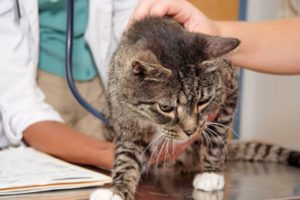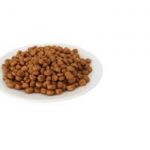Cardiomyopathy in Cats
Hypertrophic cardiomyopathy (HCM) is the most common heart disease in cats today. Cardiomyopathy means heart (cardio) muscle (myo) disease (pathy). Other cardiomyopathies in cats that you may hear your veterinarian discuss are:
- Dilated cardiomyopathy
- Restrictive cardiomyopathy
- Unclassified cardiomyopathy
Dilated Cardiomyopathy
Dilated cardiomyopathy (DCM) used to be a much more common disease in cats than it is today. In the late 1980s, it was discovered that insufficient taurine in feline diets was the cause of most cases of dilated cardiomyopathy. Taurine is an amino acid that cats cannot produce, but must obtain by eating meat. It is essential that the food you feed your cat contains adequate amounts of taurine. This is one reason why home-cooking for cats is risky. Once the cause of DCM was identified, all commercial diets were supplemented with taurine to prevent this disease from developing.
 In dilated cardiomyopathy, the heart muscle weakens and the heart becomes large and contracts weakly. Eventually, there is a buildup of fluid in the lungs (pulmonary edema) and the chest cavity (pleural effusion), a situation that is referred to as congestive heart failure.
In dilated cardiomyopathy, the heart muscle weakens and the heart becomes large and contracts weakly. Eventually, there is a buildup of fluid in the lungs (pulmonary edema) and the chest cavity (pleural effusion), a situation that is referred to as congestive heart failure.
As with HCM, diagnosis requires an echocardiogram. The cat’s taurine concentration can be measured with a blood test. To be valid, taurine must be assessed prior to beginning taurine supplementation. Because taurine is also essential for vision, your veterinarian might also look in your cat’s eyes to look for other signs of taurine deficiency, such as central retinal degeneration.
If taurine deficiency is the cause of cardiomyopathy, most cats who survive for more than 7 days after beginning taurine supplementation will recover and most will ultimately need no ongoing therapy when the heart muscle returns to normal. This usually takes 4 to 6 months. During the initial treatment period, and for long as it takes for the heart muscle to recover, congestive heart failure must be aggressively managed and the risk of clots to the limbs and other organs (as well as sudden death) are always a concern as discussed in the section on HCM.
Unfortunately, most cases of DCM today are not related to taurine deficiency. In such cases, treatment is aimed at managing congestive heart failure when it develops. Your veterinarian will be able to choose the most appropriate drugs and therapies for managing congestive heart failure.
Restrictive Cardiomyopathy and Unclassified Cardiomyopathy
These less well understood forms of cardiomyopathy also require diagnosis by echocardiography. There are no specific known causes or treatments.
Affected cats are also at risk of congestive heart failure, sudden death, and clots to the limbs and other organs.
Cat Veterinarian in Houston Heights
Urban Animal Veterinary Hospital
1327 Yale St
Houston, TX 77008
(713) 863-0088


